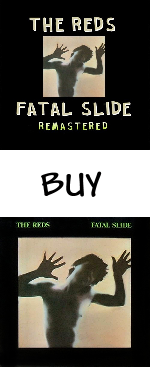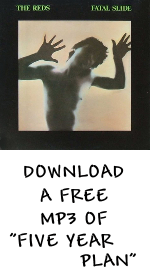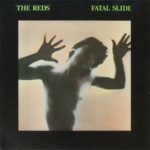
1982
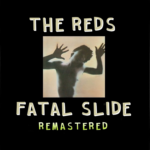
2021
ALBUM REVIEWS ↓
David Fricke, Musician Magazine
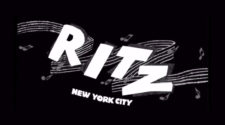
Some bands have all the luck. And some bands have none. The Reds, a punky metal foursome from Philadelphia with the patience of saints and the sound of a construction crew in Hell, have little more than others, but still far less than most. After two moderately successful independent singles, they said “I do” to A&M in 1979, leading the company’s first rush of new wave signings after the debut upset victories of the Police and Joe Jackson. But A&M’s promotion was less than zero for their album, The Reds, a nine song, molten green-vinyl slab of atomic guitar fuzz and primal bawling that suggested Cheap Trick in analysis, or Joy Division in a barroom brawl. The Reds are now into their third manager in five years, can barely get arrested in their hometown (where snotty upstarts are already dismissing them as old wave) and can only get their records released by the small but hardy Stony Plain label in Edmonton, Canada.
But their misfortune has only made the Reds meaner. Led by singer/songwriter/guitarist Rick Shaffer’s ultra-distortion chords and raw fingernails-down-the-blackboard yell, the band recently beat a sparse, lethargic Tuesday night crowd at New York’s Ritz senseless with a menacing confidence and ferocious passion barely contained by the grooves of their last two albums, Stronger Silence and Fatal Slide. Bruce Cohen pushed his keyboards into overdrive, the serrated Suicide-like edge of his synth drawing blood from songs as hard as the three-minute bullet Gone Too Far and mutant Gothic shuffle Slippin’ So Tight. In the backfield, drummer Tommy Geddes and bassist Jim Peters (who bears a distinct resemblance in looks and the smart muscular clip of his playing to Jefferson/Tuna/SVT thumper Jack Casady) hammer down like an anvil rhythm chorus, anchoring to ground zero rock n’ roll Shaffer’s flights of rage.
What probably flusters A&R departments is that The Reds stand proud and uncompromising at a noisy disorienting intersection of big arena heavy metal and faster-louder hard-core punk. Like a tightly wired Raw Power Stooges, with Rick Shaffer substituting pointed anger and shattered-mirror screams for overblown Iggy excess, they combine fat power chords and dentist drill riffs, real AC/DC stuff, with brute breathless beat attacks, while Bruce Cohen deftly triggers sound-effects punctuation and paints dark keyboard brushstrokes with the wily atmospheric approach of Roxy-era Eno. And in Shaffer, The Reds have a writer who knows how to color his white noise with melody and rhythmic tone. Of the two new songs in the band’s Ritz set, All So Wrong opened with a migraine tribal rumble and the guitar and keyboards in a police siren duet before breaking into a frantic Ramones-ish dash. Cohen’s organ rippling under Shaffer’s pained vocal. Terror In My Heart was harsh agro-funk, a slice of heavy metal New Order with a jungle drum boogie distantly related to Peter Gabriel’s current ethnic-bop experiments.
“Okay, it’s all rockers from here on out,” cracked Shaffer about two-thirds of the way through the show. And he wasn’t kidding. You Don’t Know from Fatal Slide, Do You Play The Game from the criminally under recognized Stronger Silence and finally Victims and Self Reduction from that A&M debut – all whiplash rockers, heavy enough for the hardiest headbanger, yet powered by a post-punk urgency and lyrical frankness that reaches peak intensity in the manic crescendo of Self Reduction, with Shaffer’s voice exploding in metallic shards of horror against a hypnotic synth triplet as his guitar goes into freak-out gear.
The Reds are not America’s only underground warriors in distress, but for my money, they are among the best. The Reds deserve your green; you need the experience. A fair trade, I’d say.
∎ David Fricke, Musician Magazine, 1982
Rob Patterson, On Music & Media

With their A&M debut, The Reds, made more than a few ripples during the early days of new wave, and then the hot and promising Philly band seemed to disappear. But this new indie LP demonstrates that the slide wasn’t fatal. It also shows The Reds’ incredible musical solidity and vitality, which has only deepened and matured. In fact, they now truly embody the best of a modern rock ‘n roll band — tight, imaginative grooves; an instrumental sense of adventure and fun; and vocal twists that are not affected, just effective. The semi-funky title cut, the clever and tricky instrumentals on Mister Z, the hit bound catchiness of Do What You Want (which seems perfectly poised in the commercial netherland between Gang Of Four and Foreigner) and the rock hard delivery of Gone Too Far, are the best moments, but there are surely other ones just as appealing to other tastes on this vibrant disc.
With each spin this record sounds better and better, making The Reds (once again) one of the smartest bands of the season.
■ Rob Patterson, On Music & Media, 1982
Darlene St. Pierre, Westender, Vancouver, Canada

So these guys sound pretty tough. Uncompromisingly tough. They’re like hitting a raw nerve, gashing an open wound. Heavy. Scary. Possessed vocals on the verge of total freak out, yet never going over that edge, staying just this side of restraint. Predominant style — forceful post-punk rock.
Fatal Slide is the third album for this Philadelphia band, The Reds were not hard core enough to appeal to hometown punks, but too rough for norm-radio. They are more accessible now then on their first album. Bonuses are in the trumpet work of Asbury Dukes member Louis Parent, noticeable on the banshee, slow funk of Forget, this listener’s fav cut.
This album sounds better with each spin.
- Darlene St. Pierre, Westender, Vancouver, Canada, 1982
J.D. Considine, Rock Short Takes, Musician Magazine

The Reds use electronics the way great pop singer use strings — to define a mood, not to make up for lack of interest elsewhere. Which is probably why The Reds’ music sounds so much more human than that of other circuit-bored bands, not to mention infinitely more rock ‘n roll. Of course, good songs help too, and The Reds are inventive tune-smiths, although not quite as consistent as I’d like. But since the playing is generally exciting enough to take up the slack, I rarely mind.
- J.D. Considine, Rock Short Takes, Musician Magazine, 1982
Jerry Zelesnikar, Minnesota Daily

The band is The Reds, and though they hail from the city on the Delaware River, they don’t sound like Hall and Oates, which is probably what got them into trouble with their record company. With the aid of a true anthem of despair, Self Reduction, The Reds ascended into the Gucci-lined offices of A&M Records. The song evoked American life at its worse, and deftly avoided the one-chord wonderment of the British view of life-as-shit.
This was a mournfully downcast vision of turning off that the record big shots understood. Punk, whatever that was, was the rage, so they plugged in an in-house producer, cut the LP into green vinyl, and waited for the money. When success and sales failed to materialize, the convivial executives hastened the band to their West coast lair to address the problem. “Remove the gloom, cast aside the sordid glimpses of reality. Soften the sound. Plane the edges with acoustic guitar.” The band laughed and bid adieu.
Instead of securing another mega-company recording deal, The Reds returned to the studio, enlisted a producer with some feeling for their ideas, and cut two LP’s, then licensed both to the Canadian label, Stony Plain. Though not rich for the effort, they are at least satisfied. This means The Reds are still The Reds, not the Multicolors, or the Pinks. Their 7th Street Entry performance proved it, and they etched their message into the basement walls.
∎ Jerry Zelesnikar, Minnesota Daily, 1982
Allan J. Moore & Nancy Leigh Carson, Vinyl History

Though they were relatively unknown at this point in their career The Reds cast a long shadow over the music of the early 1980’s. This masterpiece is what we see as the “Keyboard album.”
The brand is still dominant, but The Reds are always moving forward. The power on Fatal Slide comes from Bruce Cohen’s keyboard, driven by the rhythm section of Tommy Geddes (drums) and Jim Peters (bass). Rick Shaffer (guitar) concentrates on a superb set of lyrics. His vocals are sometimes ominous, sometimes angry, and at times understanding.
As usual there are no soft spots on the album but Fatal Slide, Social Service, Do What You Want, and the hypnotic Mister Z, are songs every music head needs to hear.
It’s possible that Fatal Slide could serve as an artistic template for Depeche Mode, starting with the “Black Celebration” period, but that’s some Vinyl History musing over another Red’s outstanding record.
Take this one to a quiet spot relax and enjoy magnificent music.
● Allan J. Moore & Nancy Leigh Carson, Vinyl History
Craig MacIinnis, The Calgary Sun, Calgary, Canada

PASSIONATE REDS PLAY FOR KEEPS
A drum beat ominously signals the start of the set. Tommy Geddes’ percussive pounding sets up a spare and rigid rhythmic structure. The beat is full of minimalist persistence. Enter the guitar and keyboards, slashing out terse riffs that slice violently through the air. The scenario is complete when vocalist Rick Shaffer joins in, his harsh voice spitting out lyrics.
Be warned. The Reds are not a band for all occasions. They play for keeps.
The Philadelphia quartet, takes a single-minded approach to its music. The songs are relentlessly dark, dominated by biting rhythms, and angular melodies. Much of the credit has to go to the rhythm section whose taut interplay anchors the aural attack. And, when Shaffer sings, his voice resonates with desperation.
The Reds’ songs are chilling classics from the post-punk genre.
∎ Craig MacIinnis, The Calgary Sun, Calgary, Ontario, Canada, 1982
Alan Kellogg, Edmonton Journal, Edmonton, Canada

It’s not easy being out there on the cutting edge of pop music these days.
Hailed by the U.S. rock press as one of that country’s best post-punk bands after initial industry put-downs, Philadelphia’s The Reds have come full circle in less than three years.
Fatal Slide, the group’s uncompromisingly tough and often powerful third album, has recently been released by Edmonton-based Stony Plain Records, and that’s just fine with Rick Shaffer. “We’re only going to work with people that are into it for the music,” he emphasizes on the phone from home, “and (label owner) Holger Petersen is into the spirit of it.”
“After the first album, (American label) A&M flew me to Los Angeles to separate me from the other guys in the band, sat me down, and said, ‘Boy, this is not art, it’s a business to make money.’ I couldn’t believe it. Now, we have deals with small independent companies all over the world. and that’s the way we want it.”
The album’s title cut represents The Reds at its lucid best, chronicling the slow fall of an innocent to the very bottom with frightening accuracy and raw-nerved emotion. “It actually happened to a friend of mine,” say Shaffer, “who lost everything in the space of a month, and ended up being beaten to death in a holding cell for drunk drivers. It means a lot to me.”
- Alan Kellogg, Edmonton Journal, Edmonton, Alberta, Canada
Gene Kosowan, Air Tight Magazine, Edmonton, Canada

There’s no stopping The Reds this time around. After getting burned by an A&M Records deal, these Philadelphia boys have redirected their musical priorities and now have emerged with their punchiest album to date. They may have been able to slog it out during a two-year dry spell, but one wouldn’t guess that they were survivors by glancing at the title of their third album. It’s called Fatal Slide, a negative reflection on their abilities considering the power of the material concealed within and their potential to blow their American new music counterparts out of the water.
Their minds may be in Europe, but they do manage to pull off some moments of pure innovative genius, especially in the album’s most experimental selection, Mr. Z. Throughout the song, a mutated Jaws-like riff from bassist Jim Peters, clashes with the reverberative trumpet-work of Asbury Jukes member Louis Parent. All this is topped by the banshee wails of lead guitarist/singer Rick Shaffer, which doubles as the album’s most distinguishing trademark.
Side one may reflect the reckless abandon of the group’s abilities, but the flip arguably has the air of being targeted towards major airplay stations. Likely contenders for hit singles could be Do What You Want or Gone Too Far. Nothing wrong with that, but are the big boys going to listen? The divergent beats of Tommy Geddes, with the gliding eerie ivory work of Bruce Cohen, especially on Slippin’ So Tight and You Don’t Know, could ease some of these doubts.
It all adds up to the fact that The Reds have a good enough formula to grab the aloof ears of radio programmers, who seem to have it fixed in their minds that the new music revolution begins with The Boomtown Rats, and ends with U2. To stave off further acts of cultural genocide, all they have to do is look in their own back yard.
- Gene Kosowan, Air Tight Magazine, Edmonton, Alberta, Canada, 1982
Graham Hicks, Edmonton Sun, Edmonton, Canada

Red With Desire — Band Bets On Own Image
Rick Shaffer could have made his Faustian deal. Three years ago, his band, The Reds, had a contract with a major record company. The singer/songwriter was quietly pulled aside by the company’s top brass. Come over to our side, they suggested. Why don’t you get rid of your band, soften your image, your looks, and your lyrics. We’ll make you a star, they whispered, waving dollar bills in front of Shaffer’s face.
Hundreds of thousands of dollars, Rick, if you’d just serve yourself up, once and for all, to the star-making machinery. “I was tempted,” says Shaffer from his Philadelphia home. “Until I thought, would I be happy doing that? It took two seconds to say no.”
Financially, that “no” was costly. Morally, Shaffer figures he saved his soul. For The Reds have gone on to become one of America’s leading renegade rock bands.
American radio does not take kindly to those who buck the star-making machinery. The Reds haven’t had the exposure to create a large audience outside their widening circle of cult fans.
The Philadelphia band chose to continue on its own, touring and recording without compromises for the sake of airplay, marketing albums through small, independent labels. The band’s third album, Fatal Slide, has just been released in Canada through Edmonton’s Stony Plain Records.
Often compared to The Clash, Shaffer begs to differ with the radical English band on content. “The Reds are not outwardly political. I’m more interested in what is happening within — the inner madness. I think that has to be together before the political thing can happen.”
In the song Fatal Slide, Shaffer tells the story of a friend beaten to death in prison — a man whose life fell apart within a month.
The empty cheeriness — the sameness of radio rock — irritates Shaffer. “Pop music doesn’t want to look at the other side of life. Everybody has that side within them. It’s something that should be expressed in music.” The Reds have made a commitment to musical intensity rather than financial security. “Intensity is an obsession with the band. It’s what we have to do. If you do what’s natural for you, you’re going to have your greatest success.”
The group commitment has made it a strong touring act. “Surprisingly, we’re well accepted in the big rock clubs. People that see us accept us. It’s just getting past radio that’s a problem.”
Touring through Western Canada in the late summer, The Reds will be spreading the renegade word as they have for the past three years. “We have broad support — pockets of fans in Europe, Japan and Canada. It’s not broad-based, but Reds fans are fierce about the band.”
Will the wear and tear of touring, and living on peanut butter sandwiches, insidiously suck away the intensity the band so highly values? “I can’t see it,” say Shaffer. “Miles Davis is an intense musician. Muddy Waters still plays intensely. If you set yourself up like that from the word go, and don’t get distracted by dollars, your career will last.”
- Graham Hicks, Edmonton Sun, Edmonton, Ontario, Canada, 1982
